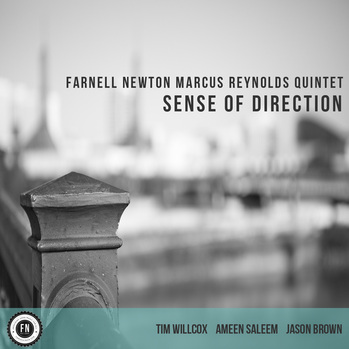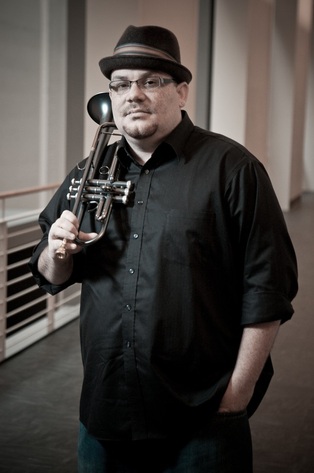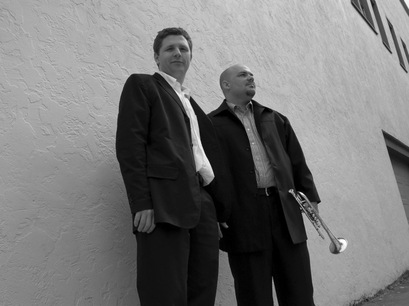
This is good news for fans and for soon-to-be-fans alike as the delightful recording has now been given a new life. There is no danger that the music is dated or out-of-touch because these compositions sound as if they have already been part of the jazz corpus for decades. The packaging is much more elegant with a cover photo from one of Portland’s fabled bridges.
The opening of the album makes the listener immediately grateful for the second-chance to hear this music. The piece is “The Two Larrys” composed by Marcus Reynolds in tribute to two organists Larry Young and Larry Golding.
Farnell and guest alto saxophone player Tim Willcox make for great interplay and trade-offs. They hint at sounds reminiscent of Nat and Cannonball Adderley. Marcus Reynolds’s piano solos are an exhibition of skill and heart.
The YouTube link below will let you hear "The Two Larrys."

That is not because of the choice of material. Indeed almost all of these tracks have been composed by Marcus Reynolds or Farnell Newton. It speaks of the quality of musicianship. One reviewer wrongly criticized the album for showing “too much restraint.” It is not restraint; it is discipline and that requires courage and skill.
This is amply proven on the third track entitled “Lover’s Groove.” Farnell is masterful in his tone and approach. “Lover’s Groove” is an original composition by Farnell and it showcases his trumpet while allowing Saleem and Brown to carry on a beautiful supporting rhythm section. Marcus keeps the cool chords beneath the horn solos and follows with sweet melodies.
Throughout the album, neither Farnell nor Marcus ever lose touch and Ameen and Jason maintain a tight undercurrent that the horns and piano can simply glide upon.
“Pendulums” starts off like a precision piece but opens quickly into an expressive vamp for Farnell. Jason Brown is at his swinging best here. The number returns to precision for the close which sets up the follow-up track nicely.
That follow-up is “The Bluest Eyes” and is another Farnell composition. The piano creates avant-garde sensitivities while Farnell’s trumpet is dead-on and dedicated. In the end, the piano conforms to the horn and the unity is delightful.
Bossa nova makes an unexpected but warmly received appearance on the Marcus Reynolds original “Litoral.” The piece is a tribute to Ivans Lins, the Grammy-winning Brazilian artist and composer whose first hit was performed by the legendary Elis Regina in 1970. He won two Grammys in 2005 and was nominated for an additional three in 2009.
He also recorded a fusion album with Dave Grusin and Lee Ritenour which brought great acclaim. The album was entitled “Harlequin” and was also a commercial triumph.
"Litoral” is a well-written and exceedingly well-performed piece that brings out the heart of Farnell and Marcus in full display. There is a great integrity and generosity in their delivery and cooperation. This one had me hit “replay” several times.

Marcus and Farnell do honor to the great song and its composer by declaring their unique interpretation of it. Tim Willcox makes another appearance here and the results are rewarding. Their blend of sax and trumpet is rich and tone-perfect. The Van Heusen song becomes their own before all is finished.
“Noir” is a Reynolds original and sounds just like theme music from the film-noir era. The truth is that Reynolds had wondered what the “Pink Panther” theme would sound like if Wayne Shorter had written it instead of Henry Mancini. “Noir” is the result of that reverie. For myself, I found transported more like to the “Office of Archer and Spade” than that of Inspector Clouseau. But you get the point. It is definitely a wistful and winsome piece.
“The Forces of Gravity” closes out the album and it finishes in style. There are great solos from Farnell and Marcus on this last track. Ameen creates a bass groove that holds down the rhythm as Jason turns in some of his coolest brushwork and swings the album to its conclusion.
The album is a happy meeting of Portland and New York City and both sounds benefit from each other. There is no weak moment on the album, at all. The compositions are warm and the performances are tight and crisp.
The permanent loss of this album would have been tragic. Fortunately for jazz lovers, Farnell Newton had the foresight to maintain ownership of the master recordings and was thus able to re-release them. Smart.
The album is available at FNMUSICWEB at this link.
 RSS Feed
RSS Feed
